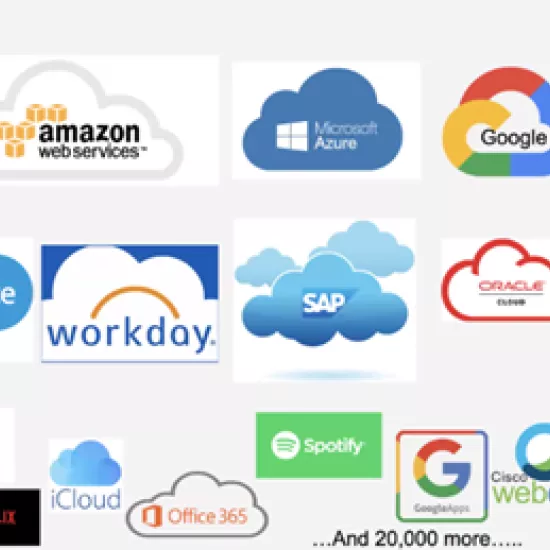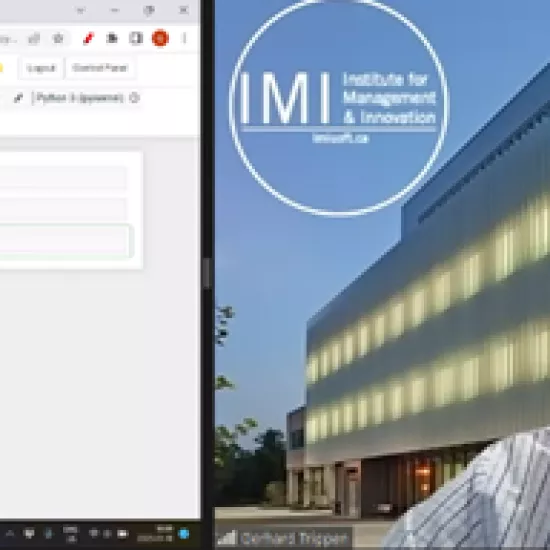Technology and the Law: Corporate Strategy and Intellectual Property Basics with Laura Crimi
On March 1st, 2023, Laura Crimi and Jeremiah Jesin-Neuberger, Lawyers at LaBarge Weinstein, presented the seventh seminar on Technology and the Law: Corporate Strategy and Intellectual Property Basic as part of the 2022-2023 IMI BIGDataAIHUB’s Seminar Series.
1. Types of IP Protection
Laura Crimi began the seminar by providing different types of Intellectual Property (IP) protection, namely: patents, trademarks, copyright, and trade secrets.
a) Patents: a patent is an exclusive right to an invention for a period of 20 years in Canada from the date of filing. Applications are submitted to the Canadian Intellectual Property Office. After 20 years the patent enters the public domain. A product, composition, machine, or process can all be protected. To be eligible the invention must be new, useful, and inventive. Here, new refers to the invention being the first of its kind in the world. In other words, it is not known to the general public in writing or in any form prior to the application being filed. Useful refers to the invention working at a practical level with a helpful function. Non-obvious means that it cannot be known or expected by someone skilled in the art. Furthermore, it should not be obvious to someone of average skills who works in the field of the invention. Improvements are also patentable, in fact, the majority of patents filed today are improvements to existing inventions.
b) Trademarks: a trademark is a company name, logo, or means of identifying goods. Trademarks can include words, designs, .gifs, packaging, sounds, scents, holograms, colours, etc. Protection is afforded to trademarks at common law and through registration with the Canadian Intellectual Property Office. Once a trademark is registered it is a protected right for 10 years from the filing and it can be renewed. A trademark should be unique and not easily confused with existing trademarks. Good trademarks are distinct, such as a coined word like Starbucks or iPhone, or words that are unrelated to the good/service, such as Blackberry.
c) Copyright: copyright is the exclusive right to produce, publish, or perform original literary, artistic, dramatic, or musical work. Copyright is automatically protected once created, therefore registration is not required. Copyright exists for a period of 70 years following your death, which is an increase that came into force in December 2022, up from 50 years of protection previously. This change was made to match copyright protection with major trading partners. Computer software is considered a literary work. Open source software may still be subject to an author’s copyright.
d) Trade secrets: a trade secret cannot be registered, the protection is that it is a secret and will not be publicly disclosed on a patent register. Indefinite protection is possible with a trade secret, as long as it is properly protected through confidentiality, NDA, and limiting the number of people who know.
2. IP In Software
Computer code alone is not physical and is not patentable under Canadian law, however, it is protected as a literary work under copyright. Although, a computer program may be patentable if it offers a new and inventive solution to a problem through modification of how the computer works.
3. Protecting your IP
Tips for protecting your IP include:
- Limit the disclosure of proprietary information
- Review employment agreements
- Have proper IP assignment
- Terms of Service, Privacy Policy, and SaaS agreements
- Open Source software
- Branding – make sure your name is distinctive and memorable
- Licensing – revenue generating
Another key strategy to protect your IP is non-disclosure agreements. These can be mutual or one-way. They should include any exceptions to disclosure. Moreover, the jurisdiction will need to be defined – it is recommended to choose a jurisdiction that is close to where you reside. Penalties for disclosure should be itemized. Finally, the length of protection should be adequate for your purposes. This depends on what you are sharing and how long you need the confidentiality to be enacted.
4. Common IP Issues in Corporate Law
A common IP issue in corporate law is proper confidentiality terms and protection of proprietary know-how. Furthermore, ownership IP assignment for employees, contractors, and consultants is a common IP issue. As well as proper oversight of the development of software where limiting use of copy left open source software, limiting use of paid/licensed software in the product, and limiting an encumbrance on your IP are important considerations. Finally, data protection and compliance with privacy law are also common issues.
5. Positioning for VC Financing
In the final section of the seminar, Jeremiah Jesin-Neuberger provided insights into how to position IP for venture capital financing.
a) Formation basics
When forming a company, first determine the structure of the corporation. Keep it simple. Perform a cost-benefit analysis to determine if incorporation is a good fit. Consider where to incorporate and be mindful to incorporate in proximity to the organization’s location of operations.
b) Equity Allocation and Vesting
Some considerations for equity allocation include whether to provide common shares, the utilization of a holding company or trust, lifetime capital gains exemptions, founder equity, dilution, promised equity to employees, and restricted shares and vesting.
Standard vesting for founders and employees is four years; one year cliff with 36 months of equal vesting. Consider “double-trigger” acceleration (50-100%) for founders and very senior hires. Evaluate time versus milestones. Clearly document the vesting schedules standard vesting for consultants/advisors is two years, vesting monthly. Consider “single trigger” acceleration upon a sale of the company.
c) Repurchase of Unvested Shares
Repurchase of unvested shares requires power of attorney. A few things to consider include the review of board composition, release from departing founder/shareholder, and power of attorney to vote on vested shares and sign resolutions.
d) Options vs. Shares
Nominal value means the issue restricted shares directly. This creates better tax treatment and starts two-year clock for capital gain exemption. Valuation event establishes a stock option plan, defers tax consequences, 409a FMV grants. Board discretion on acquisition is important.
e) Who is your client?
Shareholder disputes happen. Rules of Professional Conduct 3.2-3 Notwithstanding that the instructions may be received from an officer, employee, agent or representative, when a lawyer is employed or retained by an organization, including a corporation, in exercising the lawyer’s duties and in providing professional services, the lawyer shall act for the organization.



